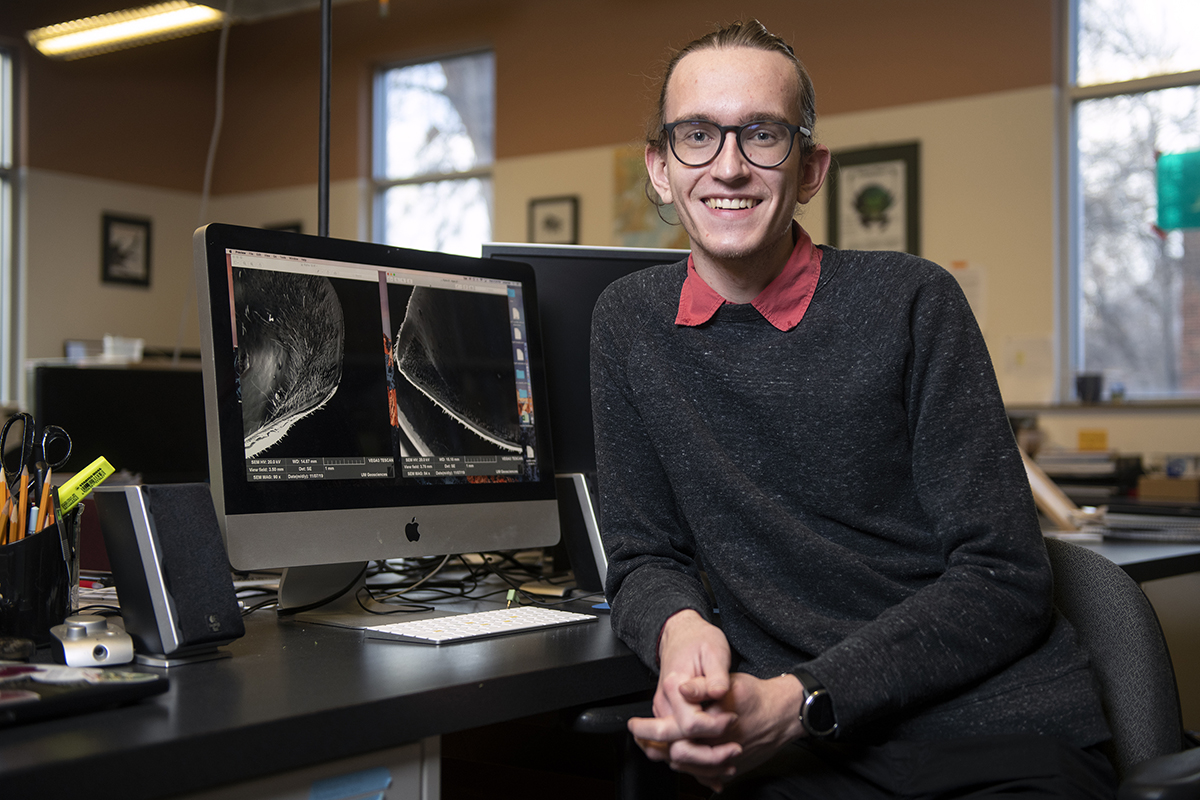UM Student Earns Top Score on MCAT Exam

MISSOULA – Devin Hunt said he technically cracked the first book to prepare for the Medical College Admission Test, or MCAT, in August. But the truth, Hunt said, is that spending four years at the University of Montana deeply embedded in microbiology and biology classes, working in research labs and studying under the tutelage of faculty mentors, meant he had really been preparing for years.
Hunt, a senior in UM’s Davidson Honors College from Colville, Washington, was recently notified of a rare, impressive feat: scoring in the 100th percentile of the MCAT exam.
Anything between a score of 524 and 528 is considered in 100th percentile, and there is no perfect score, as the exam is calculated on a percentage basis and changes from year to year. The Association of American Medical Colleges estimates that about 85,000 people sit for the MCAT every year.
The exam tests physical and biological sciences, verbal reasoning and writing skills, in addition to sociocultural, biological and physiological influences on behavior and social interactions, according to the Princeton Review.
“I fully credit the broad and robust training in the biological sciences and general microbiology I received at UM,” he said. “That training, combined with faculty who pushed my boundaries of understanding, encouraged and supported me in advising and offered me opportunities at every turn, is really what UM does best.”
Originally declaring a math major with the possibility of combining premed studies, Hunt quickly found himself enamored with the biological sciences at UM. He developed relationships and projects with faculty members representing the intersection of biomedical and microbiological sciences, ecology and evolutionary biology. That layered and broad access to health and hard sciences is what allowed him to “make connections at the systems level” when it comes to human, microbes and the environment.
Hunt immersed himself under the mentorship of Regents Professor of Evolutionary Biology Doug Emlen in UM’s Division of Biological Sciences, Associate Professor Mark Pershouse in UM’s Department of Biomedical and Pharmaceutical Sciences and Assistant Professor Patrick Secor in UM’s Center for Biomolecular Structure and Dynamics.
“Working with Devin is always a joy,” Emlen said. “His enthusiasm is infectious, and his curiosity reminds me daily of why I love my job.”
Pershouse said Hunt is “one of his best students,” and he has yet to observe Hunt “doing anything only halfway.”
Hunt said each of his professors were “constantly drawing parallels and bringing in real-world examples” to get students to view biological problems in a larger perspective. Hunt’s penchant for deep questioning is what Secor said propelled his journey at UM.
“Devin is innately curious and intrinsically motivated – skills that have served him well in the lab and classroom, and they will serve him well in his future endeavors,” he said.
His interest in the ways microbes interact with the human body only intensified this year when the COVID-19 pandemic broke out and his professors tailored coursework to make deeper connections between biology and infectious diseases.
“We know that biological systems are not static and they are uniquely influenced by their environment,” Hunt said. “Environmental elements can make humans incredibly sick and cause immense pain and suffering, as we’ve seen this year. I’m interested in what happens to microbes and humans when they come face-to-face. Are there opportunities to improve human lives? Is there an exception to a biological rule?”
Hunt said a natural inquisitiveness is what drives him. When he needed an inevitable break from academic rigor, Hunt would swim laps at Grizzly Pool on campus before walking to the library to study with classmates. A former competitive swimmer of 15 years, he said the pool is where he was offered a quiet space to reflect.
“I spent a lot of time in the pool, that’s for sure,” he said. “I needed a quiet place to go and found that swimming gave me a chance to process a lot of things I was thinking about.”
Spending several semesters as a research associate in Secor’s Bacteriophage Pathobiology Lab on campus, Hunt said his access as an undergraduate student and the critical thinking he developed greatly influenced his performance on the MCAT as he “approached the exam material in the same way” he did in class or in the lab, “although I probably didn’t’ realize it,” he said.
“What’s a better way to develop and practice critical thinking than to analyze data and investigate conclusions that either support or reject hypotheses?” he said. “The MCAT tries to measure this kind of thinking, which is what I’ve spent most of the last four years doing.”
Hunt will graduate in May, impressively finishing dual degrees in microbiology and biology in only four years.
Next year, he’ll serve as a Postbaccalaureate Intermural Research Training Fellow with the National Institute of Allergy and Infectious Diseases, which is part of the National Institutes of Health in Bethesda, Maryland. Afterwards, he plans to apply for a medical scientist training program that combines medical and doctoral degrees, where he can examine “some of the big questions facing our world and advance standards of care from benchtop to bedside.”
He said he hopes his experiences at UM, in labs, in the community and classrooms will position him to be a competitive applicant for these coveted programs.
“Tests are imperfect measures of imperfect people,” Hunt said. “A lot of people take this test. But I’m from a liberal arts college, and what’s more liberal arts than drawing connections, engaging critically in a lot of disciplines and finding those places where they intersect?”
###
Contact: Devin Hunt, UM senior, devin.hunt@umontana.edu ; Dave Kuntz, UM director of strategic communications, 406-243-5659, dave.kuntz@umontana.edu.